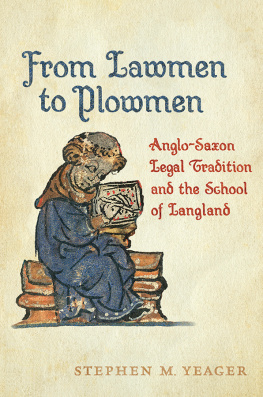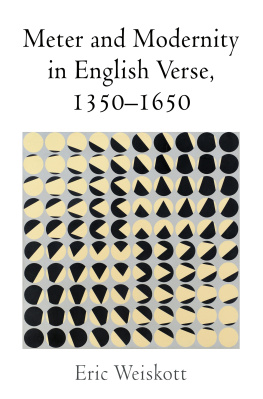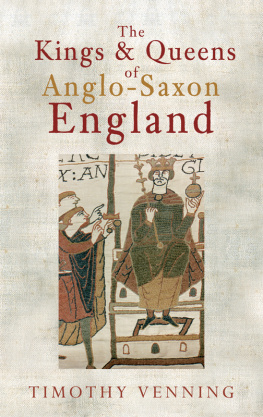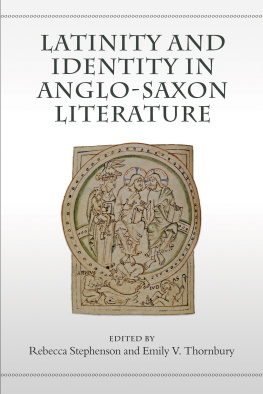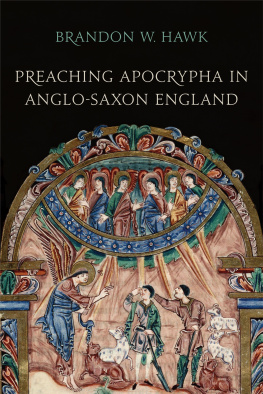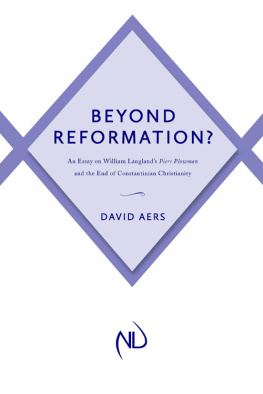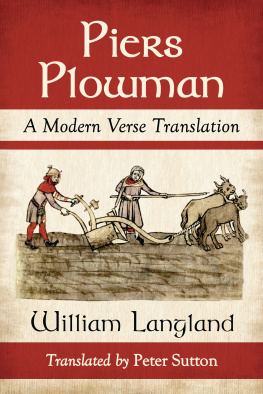Stephen M. Yeager
Printed in the U.S.A.
Printed on acid-free, 100% post-consumer recycled paper with vegetable-based inks.
Yeager, Stephen M., 1979, author From lawmen to plowmen : Anglo-Saxon legal tradition and the School of Langland/ Stephen M. Yeager.
(Toronto Anglo-Saxon Series; 17) Includes bibliographical references and index. ISBN 978-1-4426-4347-5 (bound)
1. English poetry Middle English, 1100-1500 History and criticism 2. English language Middle English, 1100-1500 Versification. 3. Law and literature England History To 1500. 4. Religion and literature England History To 1500. Alliteration. I. Title. II. Series: Toronto Anglo-Saxon series; 17
This book has been published with the help of a grant from the Canadian Federation for the Humanities and Social Sciences, through the Awards to Scholarly Publications Program, using funds provided by the Social Sciences and Humanities Research Council of Canada.
University of Toronto Press acknowledges the financial assistance to its publishing program of the Canada Council for the Arts and the Ontario Arts Council, an agency of the Government of Ontario.
University of Toronto Press acknowledges the financial support of the Government of Canada through the Canada Book Fund for its publishing activities.
Acknowledgments
Of the many colleagues and friends who have helped to shape this project, I am particularly grateful to Andrew Galloway, Manish Sharma, Jonathan Newman, Magda Hayton, Michael Van Dussen, Fiona Somerset, and Nicholas Watson, for taking the time to read and discuss variously sized portions of this book in the course of its gestation. Thanks also to my many colleagues and friends from University of Toronto, whose mentorship and advice continues to bear fruit these many years after my departure. Thanks in particular to Andy Orchard, Will Robins, David Townsend, Toni Healey, David Klausner, Suzanne Akbari, Lawrin Armstrong, and Alexandra Gillespie for their feedback and mentorship. Thanks also to Suzanne Rancourt, Charles Stuart, Stephen Shapiro, and everyone at University of Toronto Press, for applying their professionalism and skill to the production of this volume, and the many other beautiful books in their catalogue. Last and far from least, the two readers assigned by the press gave this book exactly the kind of thoughtful attention that one hopes for. All of these individuals and many others were immeasurably helpful in shaping this project; any infelicities or errors that remain are entirely my own.
Though I have made an effort to cite electronic sources when they have been consulted, a smattering of footnotes is poor recognition for the importance of several resources that were absolutely essential for this project. In particular I made constant use of the corpus searches in the Dictionary of Old English (DOE) and also the Middle English Dictionary (MED), and frequently consulted the British Academy Royal Societys Anglo-Saxon Charters homepage, whose resources have evolved considerably since I began this project in 2006. In particular I relied heavily on Dr Sean Millers searchable database of Anglo-Saxon charters before it was modified for inclusion in the Electronic Sawyer website (http://www.esawyer.org.uk/). The Electronic Sawyer and the Early English Laws site (http://www.earlyenglishlaws.ac.uk/) are excellent resources, which invite only the criticism that they did not come into existence fast enough to play the central role in this study that they otherwise would have. I have attempted to integrate them as much as possible, to facilitate the work of future scholars who will no doubt rely upon them heavily.
Portions of this book were presented as invited lectures and conference papers at McGill University, Columbia University, the Canada Chaucer Seminar, and the annual medieval congress at the University of Western Michigan. Thanks to all of those who attended these presentations for their questions and insights. Work done on this book was also supported financially by Wayne State University and Concordia University. Thanks to the many wonderful colleagues in both places for their advice and personal support, including especially Ellen Barton, Robert Aguirre, Arthur Marotti, Ken Jackson, Simone Chess, and Liz Reich at Wayne State and Jason Camlot, Jill Didur, Marcie Frank, and Kevin Pask at Concordia.
Portions of this book are also forthcoming or in print, in journal articles and as book chapters. My article The New Plow and the Old: Law, Orality, and the Figure of the Plowman in Passus B 19, forthcoming in the volume Truth and Tales: Medieval Popular Culture and the Written Word, contains an earlier version of an argument from the first half of chapter 5; my article Lollardy in Mum and the Sothsegger: A Reconsideration in the Yearbook of Langland Studies overlaps with several of the arguments in chapter 6; and the relationship between diplomatic and literary textual criticism worked out in chapter 1 informs my edition of the South English Legendary Life of St. Egwine and my chapter in the volume Rethinking the South English Legendary edited by Heather Blurton and Jocelyn Wogan-Browne (Manchester University Press). Most recently, an article on the manuscripts of Laamons Brut overlapping with some of the claims in chapter 4 has been accepted at Arthuriana. Thanks to the editors and peer reviewers of those pieces for their feedback and suggestions.
Finally, I would like to thank my family and friends, especially my parents Scott and Susan, my brother David and sister Christine, my parents-in-law Donald and Bea Quarrie, and my children Sam and Clara. I have appreciated that they only occasionally asked very vague questions about this book, even when I interrupted our time together to work on it. Last and far from least, thanks to my wife and colleague Cynthia Quarrie, for giving me purpose, fixing my grammatical errors, and otherwise keeping me honest.
Abbreviations
ASPRThe Anglo-Saxon Poetic Records: A Collective Edition. Ed. Elliott Van Kirk Dobbie, and George Philip Krapp. 6 vols. New York: Columbia University Press, 1931, 1932, 1936, 1942, 1953.
Bethurum Wulfstan, Archbishop I of York / II of Worcester. The Homilies of Wulfstan. Ed. Dorothy Bethurum. Oxford: Clarendon Press, 1957.
BL British Library
DOE Antonette diPaolo Healey, ed. Dictionary of Old English A to G online. http://www.doe.utoronto.ca/.
EETS Early English Text Society
ES The Electronic Sawyer: Online Catalogue of Anglo-Saxon Charters. Ed. Susan Kelly and Sean Miller. http://www.esawyer.org.uk/about/index.html.
GesetzeDie Gesetze der Angelsachsen. Ed. Felix Liebermann. 3 vols. Halle: Niemeyer, 1903.
III Cn III Cnut . Gesetze, 1:279371.
LHP Leges Henrici Primi. Ed. L.J. Downer. Oxford: Clarendon Press, 1972.
MED Frances McSparran, ed. The Electronic Middle English Dictionary. Last Updated 18 December 2001. http://quod.lib.umich.edu/m/med/.

